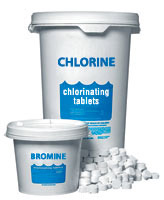
Of course, chlorine has some great advantages. (It didn’t become the king of pool sanitizers for nothing.) Stability in the sun is one of them. Bromine can’t be stabilized the way chlorine is stabilized with cyanuric acid.
So in an outdoor pool environment, bromine is highly susceptible to degradation by UV from the sun. For that reason, bromine in an outdoor pool would be an expensive proposition, as it would have to be added quite frequently. Indoors, however, that objection is largely removed. Another nice thing about chlorine is that it can be applied conveniently. It comes in handy tablets, which can be placed in the skimmer and released at a controlled rate.
You can tablet bromine, too, but it’s much slower to dissolve, so you can’t typically apply it through a skimmer. You need special equipment to apply bromine in pools, which means upfront expense, whereas with chlorine, you can apply with tablets or use granular chlorine, like dichlor or cal-hypo, which will dissolve rapidly. With chlorine you have both options — a slow-dissolving, slow-release sanitizer product or a quick release shock product. (Both chlorine and bromine can be applied with automatic feeders.)
Bromine is also a less powerful oxidizer than chlorine, so when you’re using it to break down bather waste in a pool, it’s not quite as effective as chlorine. Basically, that means the homeowner or service pro must stay on top of things or he’ll be buying oxidizer — either monopersulfate or chlorine shock — to eliminate waste buildup. (Yes, you can use chlorine shock in a bromine pool or spa, subject to certain caveats.) The biggest obstacle to bromine use in pools, however, is probably experience.
Chlorine has long been the most prevalent sanitizer in the pool industry, and most pool managers, whether professional or amateur, are trained in the use of chlorine as a sanitizer. It’s an educational barrier, however, that often leads to the selection of chlorine as the sanitizer for a new indoor pool without the consideration of the benefits of bromine.
Bromine is certainly as effective as chlorine when it comes to killing bacteria in recreational water, but there are nuances to the question of which is better. Chlorine is cheaper to buy, holds up better under the hot sun, and the technology for its use in pools is more developed and generally better understood. But, especially for the indoor pools, bromine offers distinct advantages based on its relatively benign and even helpful by products. It is left for the pool manager or builder to analyze which advantages are most important and create the best outcome for a particular pool.
Scott Webb /AQUA magazine